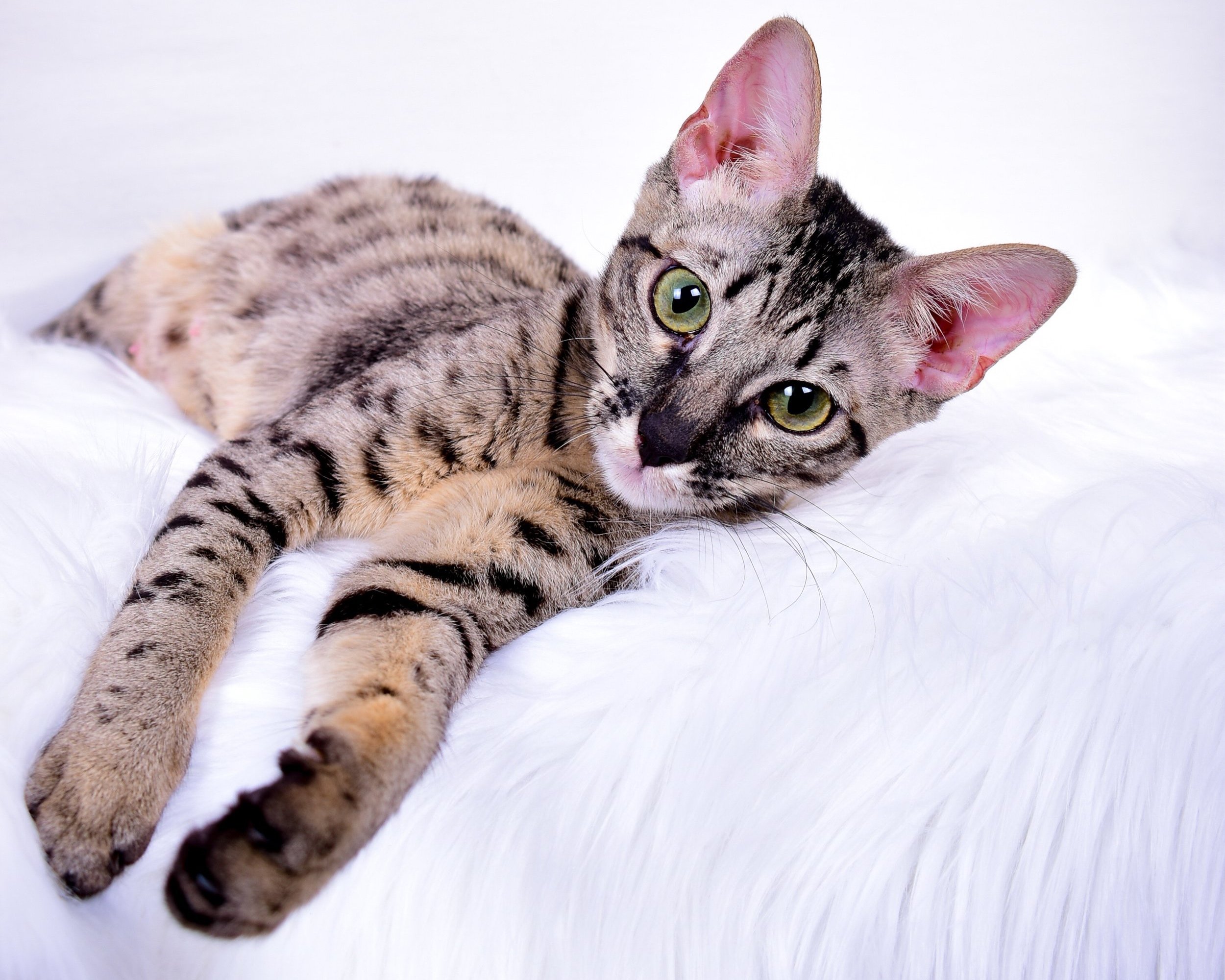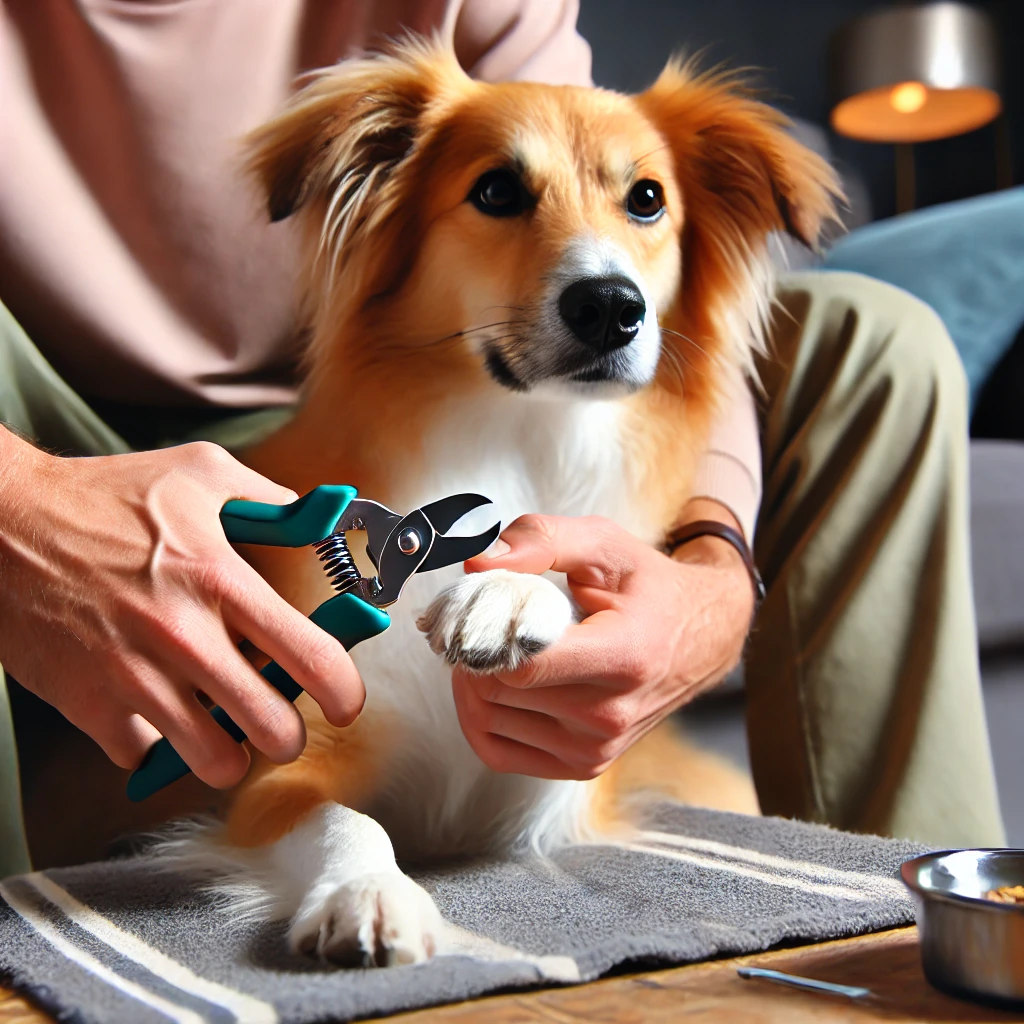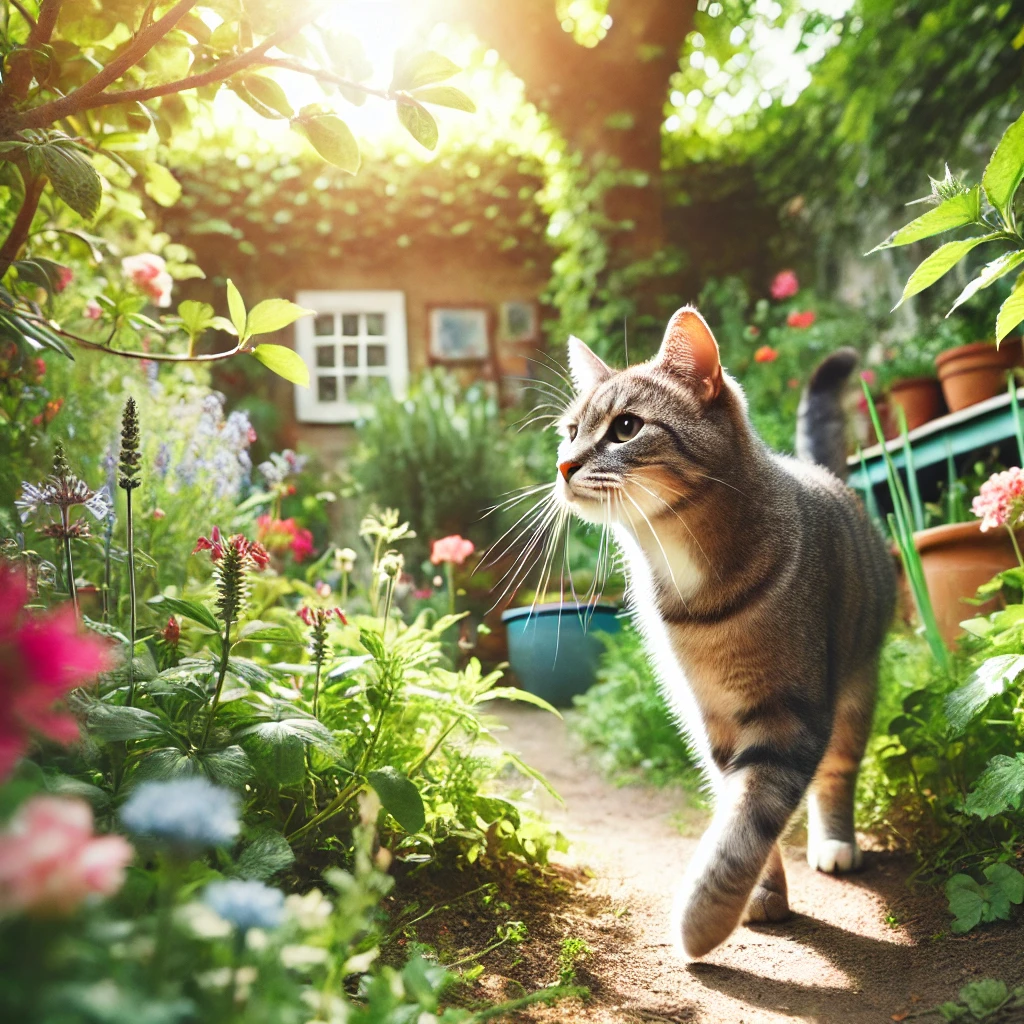Cats can suffer from a variety of health problems such as kidney disease, cat flu, worms, cancer, diabetes, obesity, urinary tract disease, and dental disease. Recognizing symptoms such as vomiting, diarrhea, weight loss, and respiratory infections can help prevent these illnesses.
Regular veterinary check-ups and proper flea and tick control are important to keep your cat healthy and happy. Additionally, washing hands before and after handling cats, seeking immediate care for sick cats, and keeping vaccinations up to date can help prevent the spread of infectious diseases such as feline leukemia virus.
By being vigilant and proactive, cat owners can protect their feline companions from common health problems and ensure their well-being.
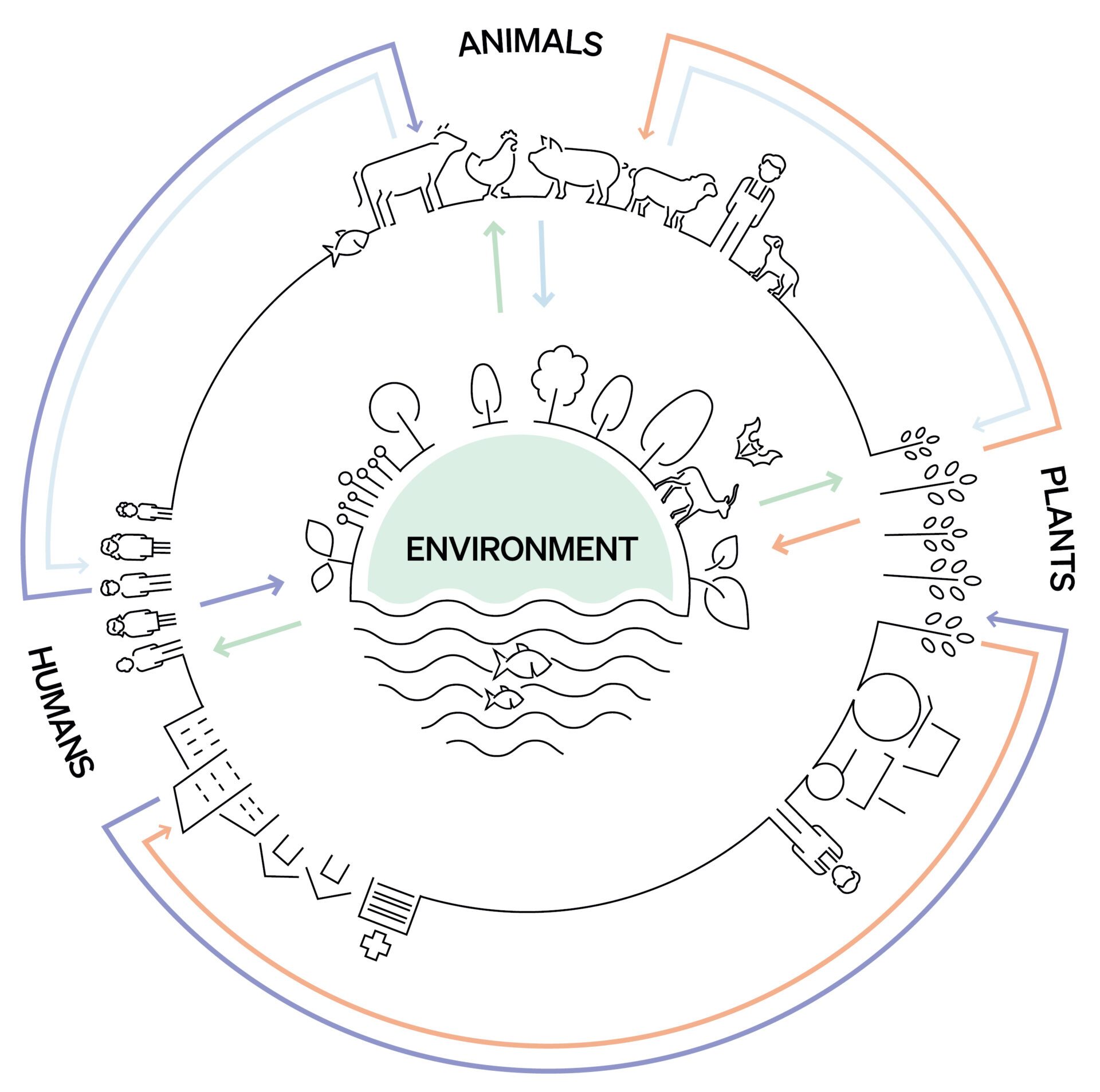
Credit: www.woah.org
Recognizing Feline Health Issues
As a responsible cat owner, it is important that you are able to recognize the signs that your feline friend may have health problems. Cats are experts at hiding their discomfort, so it’s essential to be observant and proactive in monitoring their well-being. By understanding the signs that indicate potential health problems, you can take the necessary steps to ensure your cat receives timely care and treatment.
Signs Your Cat May Be Sick
It is important to be aware of common symptoms that may indicate that your cat is not well. Behavioral changes such as increased lethargy, withdrawal, or irritability may indicate an underlying health problem. Loss of appetite, weight changes, vomiting, diarrhea and difficulty urinating are also warning signs that should not be ignored. Additionally, coat and skin abnormalities such as excessive itching or shedding can signal health problems.
The Importance Of Regular Vet Check-ups
Scheduling your cat’s regular veterinary checkups is essential to maintaining her overall health and well-being. Annual examinations allow the veterinarian to detect potential health problems in time and thus increase the chance of successful treatment. Routine checkups also provide an opportunity for vaccinations, parasite prevention, and dental care, all essential parts of keeping your cat healthy. Regular vet visits can contribute to preventative care and help ensure your cat’s long-term health.
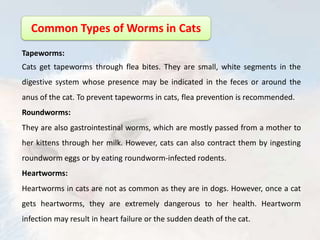
Credit: www.slideshare.net
Common Infectious Diseases In Cats
Feline Leukemia Virus (felv) Explained
Feline leukemia virus (FeLV) is a contagious and potentially fatal disease that affects cats worldwide. FeLV weakens the immune system, making affected cats more susceptible to secondary infections and certain types of cancer. The virus is commonly spread through close contact with infected cats, primarily through saliva, nasal secretions, urine and feces.
Understanding Feline Immunodeficiency Virus (fiv)
Feline immunodeficiency virus (FIV) is a lentivirus that causes immunodeficiency disease in cats, similar to HIV in humans. It weakens the cat’s immune system, making it more vulnerable to infections and some cancers. FIV is primarily transmitted through bites, so it is more common in outdoor, male and unneutered cats prone to fighting.
Non-infectious Cat Diseases
Cats, like people, can suffer from a variety of health problems, and not all of them are caused by infections. It is important for cat owners to be aware of these non-infectious feline diseases and know how to recognize and prevent them. Two common non-infectious feline diseases that can significantly affect a cat’s health are chronic kidney disease and feline diabetes.
Chronic Kidney Disease In Cats
Chronic kidney disease (CKD) is a progressive condition that affects the ability of the kidneys to function properly. It is more common in older cats, but can also occur in younger cats. CKD can be caused by a number of factors, including genetic predisposition, high blood pressure, and certain medications. Recognizing the symptoms of CKD is essential for early detection and intervention. Some common symptoms of CKD in cats include increased thirst and urination, weight loss, poor appetite, and lethargy. If you experience any of these symptoms, it is important that you consult your veterinarian for proper diagnosis and treatment. To prevent CKD in cats, it is essential to provide them with a balanced diet that supports kidney health. Feeding a high-quality cat food and providing access to fresh water can help reduce the risk of developing CKD.
The Threat Of Feline Diabetes
Feline diabetes is a metabolic disorder that affects cats’ ability to regulate their blood sugar levels. It is more common in overweight and sedentary cats. As in humans, diabetes in cats can lead to serious complications if left untreated. Recognizing the signs of feline diabetes is essential for early diagnosis and treatment. Common symptoms of feline diabetes include increased thirst, frequent urination, weight loss, increased appetite and lethargy. If you notice any of these symptoms in your cat, it is important to seek veterinary care. Preventing feline diabetes in cats involves maintaining a healthy weight through a balanced diet and regular exercise. Feeding them a low-carb, high-protein diet can help regulate their blood sugar and reduce their risk of diabetes. In conclusion, awareness of common non-communicable diseases in cats such as chronic kidney disease and feline diabetes is essential for cat owners. By recognizing the signs and taking preventative measures, you can help ensure your feline companion lives a long and healthy life.
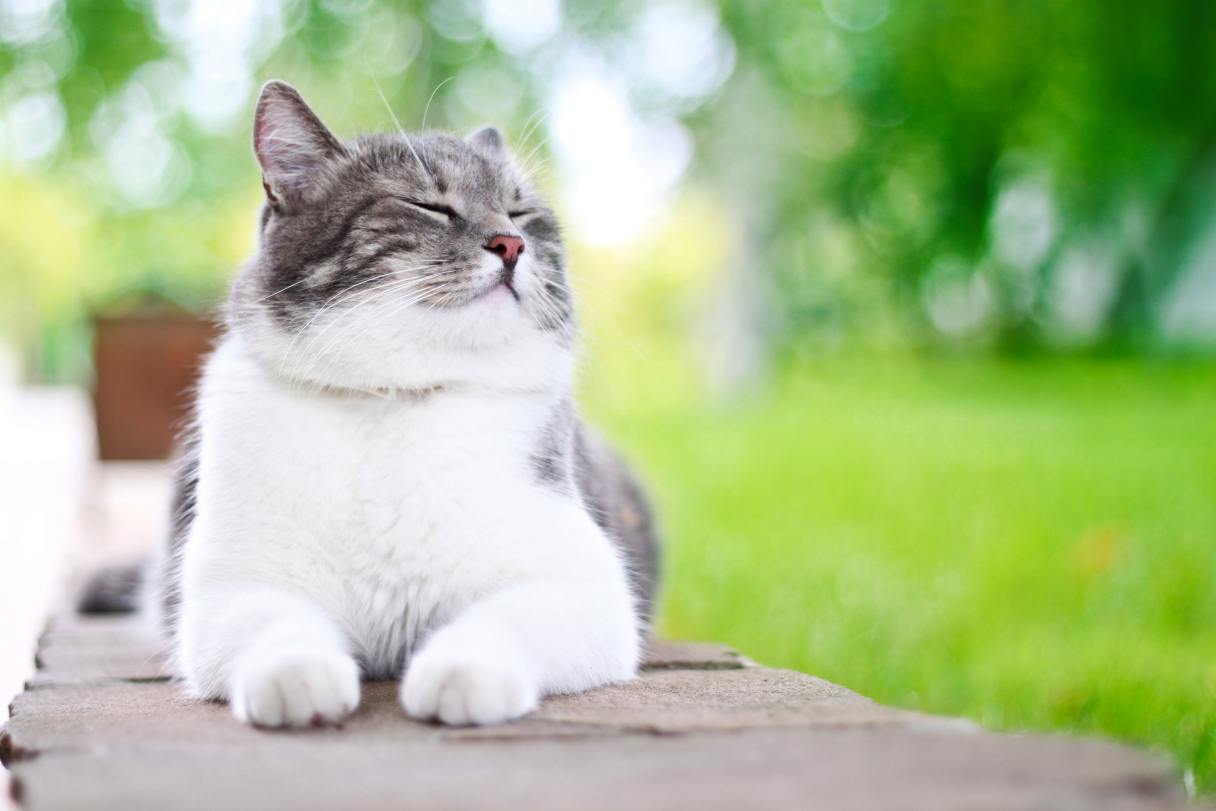
Credit: www.carecredit.com
Gastrointestinal Problems In Cats
Gastrointestinal problems in cats can manifest as vomiting, diarrhea or weight loss. It is important to recognize these symptoms and take preventative measures to maintain your cat’s overall health.
Hairballs
Hairballs are a common gastrointestinal issue in cats. When cats groom themselves, they often ingest loose hair, which can accumulate in their stomachs and form hairballs. These hairballs can cause discomfort and may lead to vomiting or constipation. To help prevent hairballs, regular grooming and brushing can reduce the amount of loose hair that your cat ingests. Additionally, feeding your cat a specialized hairball formula cat food can also assist in preventing hairball formation.
Vomiting
Vomiting is another common gastrointestinal problem in cats. It can be caused by various factors, including dietary changes, eating too quickly, or underlying medical conditions. It’s important to monitor your cat’s vomiting episodes and take note of any accompanying symptoms. If your cat is vomiting frequently, has blood in their vomit, or shows signs of dehydration, it’s crucial to seek veterinary attention. In some cases, dietary adjustments or medications may be necessary to manage the vomiting.
Diarrhea
Diarrhea is a common gastrointestinal problem that can occur in cats. It can be caused by changes in diet, ingestion of spoiled food, bacterial or viral infections, or underlying medical conditions. If your cat has diarrhea, it is essential to monitor its behavior and overall health. Mild cases of diarrhea may resolve on their own, but if they persist or are accompanied by other symptoms such as dehydration or lethargy, it is important to consult a veterinarian for proper diagnosis and treatment.
Dealing With Intestinal Parasites
Intestinal parasites can also cause gastrointestinal problems in cats. Common symptoms of intestinal parasitic infections include twitching, vomiting, diarrhea and weight loss. It is important to keep your cat’s deworming schedule up to date and ensure your vet performs regular stool checks. Preventive measures such as using appropriate flea and tick products and keeping the environment clean can also help reduce the risk of intestinal parasite infections.
Feline Dental Care
Cat dental care is essential to prevent common feline health problems such as dental disease. Regular dental exams and cleanings can help detect and prevent dental problems in cats, including tooth decay, gingivitis, and periodontal disease. Proper dental hygiene, including brushing your cat’s teeth, can also help maintain her overall health.
Hairballs
Hairballs are a common gastrointestinal issue in cats. When cats groom themselves, they often ingest loose hair, which can accumulate in their stomachs and form hairballs. These hairballs can cause discomfort and may lead to vomiting or constipation. To help prevent hairballs, regular grooming and brushing can reduce the amount of loose hair that your cat ingests. Additionally, feeding your cat a specialized hairball formula cat food can also assist in preventing hairball formation.
Vomiting
Vomiting is another common gastrointestinal problem in cats. It can be caused by various factors, including dietary changes, eating too quickly, or underlying medical conditions. It’s important to monitor your cat’s vomiting episodes and take note of any accompanying symptoms. If your cat is vomiting frequently, has blood in their vomit, or shows signs of dehydration, it’s crucial to seek veterinary attention. In some cases, dietary adjustments or medications may be necessary to manage the vomiting.
Diarrhea
Diarrhea is a common gastrointestinal issue that can occur in cats. It can be caused by dietary changes, ingesting spoiled food, bacterial or viral infections, or underlying health conditions. If your cat experiences diarrhea, it’s essential to monitor their behavior and overall health. Mild cases of diarrhea may resolve on their own, but if it persists or is accompanied by other concerning symptoms such as dehydration or lethargy, it’s important to consult with your veterinarian for proper diagnosis and treatment.
Dealing With Intestinal Parasites
Intestinal parasites can also cause gastrointestinal problems in cats. Common symptoms of intestinal parasite infections include scooting, vomiting, diarrhea, and weight loss. It’s crucial to keep your cat’s deworming schedule up to date and ensure regular fecal examinations are performed by your veterinarian. Preventive measures such as using appropriate flea and tick control products and maintaining a clean living environment can also help reduce the risk of intestinal parasite infections.
Hairballs
Hairballs are a common gastrointestinal issue in cats. When cats groom themselves, they often ingest loose hair, which can accumulate in their stomachs and form hairballs. These hairballs can cause discomfort and may lead to vomiting or constipation. To help prevent hairballs, regular grooming and brushing can reduce the amount of loose hair that your cat ingests. Additionally, feeding your cat a specialized hairball formula cat food can also assist in preventing hairball formation.
Vomiting
Vomiting is another common gastrointestinal problem in cats. It can be caused by various factors, including dietary changes, eating too quickly, or underlying medical conditions. It’s important to monitor your cat’s vomiting episodes and take note of any accompanying symptoms. If your cat is vomiting frequently, has blood in their vomit, or shows signs of dehydration, it’s crucial to seek veterinary attention. In some cases, dietary adjustments or medications may be necessary to manage the vomiting.
Diarrhea
Diarrhea is a common gastrointestinal issue that can occur in cats. It can be caused by dietary changes, ingesting spoiled food, bacterial or viral infections, or underlying health conditions. If your cat experiences diarrhea, it’s essential to monitor their behavior and overall health. Mild cases of diarrhea may resolve on their own, but if it persists or is accompanied by other concerning symptoms such as dehydration or lethargy, it’s important to consult with your veterinarian for proper diagnosis and treatment.
Dealing With Intestinal Parasites
Intestinal parasites can also cause gastrointestinal problems in cats. Common symptoms of intestinal parasite infections include scooting, vomiting, diarrhea, and weight loss. It’s crucial to keep your cat’s deworming schedule up to date and ensure regular fecal examinations are performed by your veterinarian. Preventive measures such as using appropriate flea and tick control products and maintaining a clean living environment can also help reduce the risk of intestinal parasite infections.
Hairballs
Hairballs are a common gastrointestinal issue in cats. When cats groom themselves, they often ingest loose hair, which can accumulate in their stomachs and form hairballs. These hairballs can cause discomfort and may lead to vomiting or constipation. To help prevent hairballs, regular grooming and brushing can reduce the amount of loose hair that your cat ingests. Additionally, feeding your cat a specialized hairball formula cat food can also assist in preventing hairball formation.
Vomiting
Vomiting is another common gastrointestinal problem in cats. It can be caused by various factors, including dietary changes, eating too quickly, or underlying medical conditions. It’s important to monitor your cat’s vomiting episodes and take note of any accompanying symptoms. If your cat is vomiting frequently, has blood in their vomit, or shows signs of dehydration, it’s crucial to seek veterinary attention. In some cases, dietary adjustments or medications may be necessary to manage the vomiting.
Diarrhea
Diarrhea is a common gastrointestinal issue that can occur in cats. It can be caused by dietary changes, ingesting spoiled food, bacterial or viral infections, or underlying health conditions. If your cat experiences diarrhea, it’s essential to monitor their behavior and overall health. Mild cases of diarrhea may resolve on their own, but if it persists or is accompanied by other concerning symptoms such as dehydration or lethargy, it’s important to consult with your veterinarian for proper diagnosis and treatment.
Dealing With Intestinal Parasites
Intestinal parasites can also cause gastrointestinal problems in cats. Common symptoms of intestinal parasite infections include scooting, vomiting, diarrhea, and weight loss. It’s crucial to keep your cat’s deworming schedule up to date and ensure regular fecal examinations are performed by your veterinarian. Preventive measures such as using appropriate flea and tick control products and maintaining a clean living environment can also help reduce the risk of intestinal parasite infections.
The Dangers Of Feline Obesity
Obesity is a common health issue among cats that often goes unnoticed. However, it is a serious condition that can lead to several health problems such as heart disease, diabetes, and joint problems. Just like humans, cats need a balanced diet and regular exercise to maintain a healthy weight.
Creating A Balanced Diet For Your Cat
Creating a balanced diet for your cat is essential to prevent obesity and other nutritional issues. A well-balanced diet should contain the necessary nutrients such as protein, fats, vitamins, and minerals. It is important to avoid feeding your cat with too many treats and human food, as these can lead to excessive weight gain.
To ensure that your cat is getting the right nutrients, you can consider feeding them with high-quality commercial cat food. You should also consult with your veterinarian to determine the right amount of food to feed your cat based on their age, weight, and activity level.
In addition to a balanced diet, you should also encourage your cat to exercise regularly. Playtime with toys or interactive games can help keep your cat active and healthy.
In conclusion, obesity and nutritional issues are common health problems in cats that can lead to several health issues. By creating a balanced diet and encouraging regular exercise, you can help prevent these issues and ensure that your cat lives a healthy and happy life.
Cat Skin And Coat Conditions
When it comes to cat health, it’s important to pay attention to their skin and coat conditions. A cat’s skin and coat are not only indicators of their overall health but also play a crucial role in their comfort and well-being. In this section, we will discuss two common cat skin and coat conditions: flea infestation and control, and common skin allergies and treatments.
Flea Infestation And Control
Fleas are a common annoyance for cats and can lead to various health problems if left untreated. These tiny parasites feed on the blood of your furry friend, causing itching, irritation, and even allergic reactions. If you notice your cat scratching excessively or find small black dots on their fur, it’s likely they have a flea infestation.
To effectively control fleas, it’s important to take a multi-step approach:
- Treat your cat: Start by using a veterinarian-approved flea treatment specifically designed for cats. This may come in the form of topical medications, oral tablets, or collars. Follow the instructions carefully and repeat the treatment as recommended.
- Clean your home: Fleas can infest your cat’s environment, including carpets, bedding, and furniture. Vacuum your home thoroughly and wash any bedding or fabrics that your cat frequently comes into contact with. Consider using a flea spray or powder to eliminate any remaining fleas.
- Prevent reinfestation: Use preventive measures such as regular grooming, flea combs, and maintaining a clean living environment to prevent future flea infestations.
Common Skin Allergies And Treatments
Just like humans, cats can develop allergies that affect their skin and coat. These allergies can be caused by various factors such as certain foods, environmental allergens, or even flea bites. Recognizing the symptoms of skin allergies in cats is essential for timely treatment.
Common symptoms of skin allergies in cats include:
- Excessive scratching or licking
- Redness or inflammation of the skin
- Hair loss or thinning
- Bumps or rashes
- Ear infections
If you suspect your cat has a skin allergy, it’s important to consult with a veterinarian for proper diagnosis and treatment. The treatment options for cat skin allergies may include:
- Elimination diet: Identifying and eliminating potential food allergens from your cat’s diet.
- Medications: Prescription medications such as antihistamines or corticosteroids to manage allergic reactions and reduce itching.
- Topical treatments: Use of medicated shampoos or creams to soothe irritated skin and promote healing.
- Allergy shots: In severe cases, your veterinarian may recommend allergy shots (immunotherapy) to desensitize your cat’s immune system to specific allergens.
By being aware of common cat skin and coat conditions such as flea infestation and allergies, you can take proactive steps to keep your feline friend healthy and comfortable. Regular grooming, proper hygiene, and a clean living environment are essential in preventing and managing these conditions. Remember, a happy and healthy cat starts with a healthy skin and coat!
Behavioral Signs Of Illness
Recognizing behavioral signs of illness in cats is crucial for early intervention. Look out for changes in appetite, activity level, grooming habits, and litter box behavior. Seek veterinary care for any unusual behavior to prevent common health problems in cats.
When Aggression Points To Pain
Cats are known for their independent and sometimes aloof nature. However, if your cat suddenly becomes aggressive or displays unusual behavior, it could be a sign of underlying health issues. One common cause of aggression in cats is pain. Cats may become aggressive when they are in pain as a way to protect themselves. It’s important to pay attention to any sudden changes in your cat’s behavior and consult with a veterinarian to rule out any medical conditions.
Litter Box Issues And Underlying Health Problems
Another behavioral sign of illness in cats is litter box issues. If your cat starts urinating or defecating outside of their litter box, it could be a sign of an underlying health problem. Cats may avoid using the litter box if they are experiencing pain or discomfort while urinating or defecating. This could be due to urinary tract infections, bladder stones, or other urinary issues. It’s crucial to address these issues promptly to prevent further complications and discomfort for your cat.
Preventative Measures For Cat Health
Ensuring the health and well-being of your feline friend involves taking
proactive measures to prevent common health issues. By focusing on
preventative care, you can help your cat lead a healthier and happier
life. Here are some essential preventative measures for maintaining your
cat’s health.
The Role Of Vaccinations
Vaccinations play a crucial role in safeguarding your cat against various
infectious diseases. Regular vaccinations help stimulate the immune
system, preparing it to fight off specific viruses and bacteria. It’s
important to consult with a veterinarian to create a tailored vaccination
schedule based on your cat’s lifestyle and potential exposure to
infectious agents.
Regular Parasite Prevention
Parasites such as fleas, ticks, and internal worms can pose significant
health risks to cats. Implementing a regular parasite prevention
program is essential for protecting your cat from these harmful
organisms. This may involve using preventive medications, maintaining a
clean living environment, and regularly inspecting your cat for signs of
infestation.
Emergency Situations
Cat owners should be aware of common health problems that may affect their pets, including kidney disease, cat flu, worms, cancer, diabetes, obesity, cystitis/urinary tract disease, and dental disease. Recognizing the symptoms early and seeking veterinary care can prevent and treat these issues.
It is also important to maintain good hygiene and regular checkups for cats.
Recognizing A Cat Emergency
It’s crucial for cat owners to recognize emergency situations to provide timely care. Symptoms such as difficulty breathing, severe injuries, prolonged seizures, or sudden collapse may indicate an emergency. Additionally, ingestion of toxic substances, heatstroke, or severe bleeding requires immediate attention.
First Aid Tips For Cat Owners
As a cat owner, it’s essential to be prepared for emergencies. Keep a pet first aid kit stocked with items such as gauze, adhesive tape, hydrogen peroxide, and a pet carrier for transportation. Knowing basic first aid techniques, such as administering CPR or stopping bleeding, can be life-saving in emergency situations.
Frequently Asked Questions
What Is A Common Serious Health Problem In Cats?
A common serious health problem in cats is dental disease, which is the most common disease among cats. Other common health problems in cats include kidney disease, cat flu, worms, cancer, diabetes, obesity, and urinary tract disease. Regular checkups, proper dental care, and a healthy diet can help prevent these issues.
What Is The Most Common Disease That Cats Get?
The most common disease in cats is dental disease, followed by kidney disease, cat flu, and worms. Other common illnesses include cancer, diabetes, obesity, cystitis, and dental issues. Regular check-ups, a balanced diet, and proper dental care can help prevent these diseases.
How Can You Prevent Cat Disease?
To prevent cat diseases, wash hands before and after handling cats, schedule annual checkups, seek vet care for sick cats, maintain flea and tick control, and keep rabies vaccinations current.
What Is The Most Contagious Cat Disease?
The most contagious cat disease is Feline Leukemia Virus (FeLV). It is highly contagious and causes more cat deaths than any other organism. FeLV is transmitted through close contact with saliva from an infected cat.
Conclusion
As cat owners, it is crucial to be aware of the common health issues that our feline friends may encounter. From dental disease to obesity and upper respiratory infections, recognizing the symptoms and taking preventive measures can help keep our cats healthy and happy.
Regular checkups, proper hygiene, and vaccination are some of the key steps to prevent and treat cat health problems. By being proactive and knowledgeable about cat health, we can ensure that our furry companions lead a long and healthy life.
